
Experimental and Computational Multiphase Flow
metrics 2024
Pioneering Advances in Multiphase Flow Science
Introduction
Experimental and Computational Multiphase Flow, published by SpringerNature, is a prestigious academic journal that critically examines advancements in the field of fluid dynamics, with a specialized focus on multiphase flow phenomena. Since its inception in 2019, the journal has established a remarkable reputation, attaining Q1 status in Fluid Flow and Transfer Processes as well as Mechanical Engineering according to the 2023 category quartiles, reflecting its high impact and relevance in these domains. With Scopus rankings placing it among the top 15 journals in both Chemical Engineering and Nuclear Energy and Engineering, Experimental and Computational Multiphase Flow is an essential resource for researchers, professionals, and students engaged in cutting-edge studies and applications. Although it operates on a subscription model, the journal remains dedicated to disseminating high-quality research and fostering a deeper understanding of complex fluid interactions across various scientific disciplines. By prioritizing innovative methodologies and interdisciplinary collaborations, the journal aims to significantly contribute to the ongoing evolution of multiphase flow research, recognizing its critical importance in engineering and energy sectors.
Metrics 2024
 0.78
0.78 4.20
4.20 3.50
3.50 18
18Metrics History
Rank 2024
Scopus
IF (Web Of Science)
JCI (Web Of Science)
Quartile History
Similar Journals
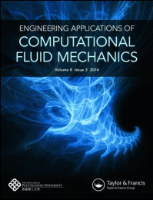
Engineering Applications of Computational Fluid Mechanics
Bridging Theory and Application in Fluid MechanicsEngineering Applications of Computational Fluid Mechanics is an esteemed journal published by Taylor & Francis Ltd that serves as a vital resource for researchers, professionals, and students in the field of fluid mechanics and its computational applications. With an ISSN of 1994-2060 and an E-ISSN of 1997-003X, this journal has established its reputation through its rigorous peer-review process and commitment to Open Access since 2015, facilitating widespread dissemination of cutting-edge research. Based in the United Kingdom, the journal is indexed in leading databases and has achieved a significant impact in its categories, ranking in the top quartile (Q1) for both Computer Science (miscellaneous) and Modeling and Simulation as of 2023. Notably, its Scopus rankings place it in the top 4% of Mathematics/modeling and simulation, highlighting its importance in advancing knowledge and innovation within the discipline. The journal invites contributions that explore both theoretical and practical aspects of computational fluid dynamics, fostering collaboration and intellectual growth within the community.

Physical Review Fluids
Advancing Knowledge in Fluid MechanicsPhysical Review Fluids is an esteemed journal published by the American Physical Society, focusing on the intricate and essential field of fluid dynamics. With an impressive Q1 ranking in categories such as Computational Mechanics, Fluid Flow and Transfer Processes, and Modeling and Simulation, this journal serves as a pivotal resource for researchers and professionals seeking to disseminate high-quality and innovative research findings. The journal's scope encompasses a broad spectrum of topics within fluid mechanics, promoting advancements in theoretical, computational, and experimental methodologies. Although it is not an open-access journal, its publications are critically well-received, underpinned by its strong standing in the Scopus rankings which place it in the top percentiles across various relevant fields. Physical Review Fluids has been a foundational platform for scholars to share their discoveries from 2016 through 2024, making it an indispensable asset in the ongoing evolution of fluid dynamics research.
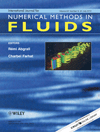
INTERNATIONAL JOURNAL FOR NUMERICAL METHODS IN FLUIDS
Unleashing Cutting-edge Techniques in Fluid DynamicsINTERNATIONAL JOURNAL FOR NUMERICAL METHODS IN FLUIDS, published by Wiley, has established itself as a leading platform for cutting-edge research in the fields of applied mathematics, computational mechanics, computer science applications, and mechanical engineering. With its ISSN 0271-2091 and E-ISSN 1097-0363, this journal is committed to disseminating high-quality, peer-reviewed articles that contribute to the advancement of numerical methodologies in fluid dynamics. Boasting a commendable 2023 impact factor that places it in the second quartile across multiple relevant categories, it provides insights into significant research dimensions that engage an audience of researchers, professionals, and students keen on the computational challenges of fluid flow. The journal's broad scope encompasses foundational and applied research, encouraging the exploration of new numerical techniques and algorithms. As an invaluable resource based in the United Kingdom, INTERNATIONAL JOURNAL FOR NUMERICAL METHODS IN FLUIDS remains dedicated to providing insights and fostering innovation in its domain, with a consistent publication history spanning from 1981 to 2024.

International Journal of Fluid Mechanics Research
Advancing Knowledge in Mechanical Engineering and PhysicsThe International Journal of Fluid Mechanics Research, published by BEGELL HOUSE INC, is a pivotal platform for the dissemination of innovative research within the fields of Mechanical Engineering and Physics. With a focus on the intricate dynamics of fluid behavior, this journal has been a cornerstone of scholarly communication since its inception in 1996, continuing to engage a global audience of researchers and professionals through to 2024. With a respectable Impact Factor reflecting its significant contributions to the disciplines—ranking in Q3 for both Mechanical Engineering and Miscellaneous Physics and Astronomy categories—this journal presents a unique opportunity for authors to share their findings in a peer-reviewed environment. Although it does not currently offer Open Access options, all published articles are carefully curated, ensuring high-quality research is accessible to its readership. As the journal navigates the complexities of fluid mechanics, it fosters an interdisciplinary dialogue, bridging theoretical frameworks with practical applications, thereby enhancing understanding and innovation in related fields.

JOURNAL OF ENHANCED HEAT TRANSFER
Bridging Theory and Practice in Thermal ManagementThe JOURNAL OF ENHANCED HEAT TRANSFER, published by BEGELL HOUSE INC, is a prominent resource for researchers and professionals in the fields of mechanical engineering, fluid flow and transfer processes, and condensed matter physics. With a history spanning from 1993 to 2024, this journal offers a platform for disseminating cutting-edge research and innovations that enhance our understanding of heat transfer phenomena. Although it operates under a traditional subscription model, its impressive standing is underscored by its Scopus rankings—positioned within the 59th percentile for Mechanical Engineering and 58th percentile for Fluid Flow and Transfer Processes. Additionally, it holds Q2 and Q3 categorizations in relevant fields, reflecting its importance in advancing knowledge and applications in heat transfer technology. This journal effectively bridges the gap between theoretical insights and practical solutions, making it an indispensable tool for academics, industrial practitioners, and students eager to explore advancements in thermal management and efficiency.
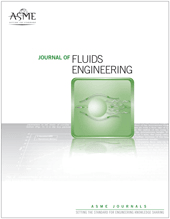
JOURNAL OF FLUIDS ENGINEERING-TRANSACTIONS OF THE ASME
Unveiling Insights in Thermal and HydrodynamicsJOURNAL OF FLUIDS ENGINEERING-TRANSACTIONS OF THE ASME, published by the renowned American Society of Mechanical Engineers (ASME), stands as a pivotal platform for disseminating cutting-edge research in the field of mechanical engineering, specifically focusing on fluid mechanics and its diverse applications. With an established history dating back to 1897, this journal features research that pushes the boundaries of knowledge and technology in areas such as fluid dynamics, thermal engineering, and hydrodynamics. Although it is not an open-access journal, it maintains rigorous peer-review standards, ensuring the publication of high-quality scholarly articles that contribute to the academic and professional community. In the latest rankings, it holds a respectable position within the Q2 category of mechanical engineering journals, reflecting its significant impact, as evidenced by its Scopus rank of #204 out of 672, placing it in the 69th percentile. Researchers, professionals, and students alike will find this journal to be a vital resource for the latest developments and innovative insights in fluids engineering.
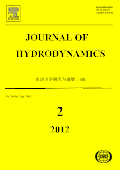
Journal of Hydrodynamics
Empowering Researchers Through High-Impact HydrodynamicsWelcome to the Journal of Hydrodynamics, a premier academic journal dedicated to pioneering research in the fields of Condensed Matter Physics, Mechanical Engineering, Mechanics of Materials, and Modeling and Simulation. Published by Springer, this esteemed journal has been a vital resource since its inception in 1990 and boasts a notable Q1 ranking across its relevant categories, underscoring its importance in advancing knowledge and innovation. With a robust Scopus ranking reflecting its impact—such as being in the 82nd percentile in Mathematics: Modeling and Simulation and the 75th percentile in various engineering disciplines—the journal serves as a critical platform for researchers, professionals, and students. While not currently an open-access publication, the Journal of Hydrodynamics remains committed to fostering scholarly dialogue and disseminating high-quality research that shapes the future of its field. Our mission is to provide a comprehensive forum for the discussion of theoretical and applied hydrodynamics, potentially influencing both academic inquiry and practical applications worldwide.

Computational Thermal Sciences
Advancing the Frontiers of Thermal InnovationComputational Thermal Sciences, an esteemed journal published by BEGELL HOUSE INC, presents cutting-edge research at the intersection of computational mathematics, energy engineering, and fluid dynamics. With an ISSN of 1940-2503 and an E-ISSN of 1940-2554, this journal aims to disseminate high-quality research articles, reviews, and methodologies that improve our understanding of thermal processes and their applications. Renowned for its solid impact in the field, it holds a Q3 ranking in multiple categories including Computational Mathematics and Energy Engineering for 2023. As the field evolves, the journal continues to play a pivotal role in bridging theoretical research with practical innovations, thereby catering to a diverse audience of researchers, professionals, and students. Although it operates on a subscription model, the journal ensures accessibility to significant contributions in thermal sciences from 2009 to 2024, fostering an environment of knowledge sharing and collaboration.
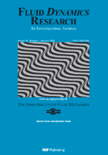
FLUID DYNAMICS RESEARCH
Exploring Interdisciplinary Insights in Fluid FlowFLUID DYNAMICS RESEARCH, published by IOP Publishing Ltd, is a pivotal journal dedicated to advancing the understanding of fluid dynamics through interdisciplinary research that spans several domains including mechanical engineering and physics. With an ISSN of 0169-5983 and E-ISSN 1873-7005, this journal provides a vital platform for researchers aiming to disseminate new findings and theoretical advancements in fluid flow and transfer processes. As of 2023, FLUID DYNAMICS RESEARCH holds a commendable position within the academic community, ranked Q3 in fluid flow and transfer processes, mechanical engineering, and miscellaneous physics and astronomy categories. The journal showcases a diverse array of articles that not only inspire collaboration among professionals and students but also ensure that theoretical and experimental studies are accessible for further development in the field. Operating from the United Kingdom, the journal offers a unique opportunity for scholars worldwide to contribute to the vibrant community dedicated to understanding the complexities of fluid dynamics, even as it anticipates converging its years of research from 1986 to 2024.
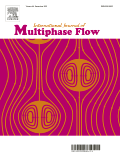
INTERNATIONAL JOURNAL OF MULTIPHASE FLOW
Innovating the Future of Fluid MechanicsINTERNATIONAL JOURNAL OF MULTIPHASE FLOW, published by Pergamon-Elsevier Science Ltd, is a premier platform dedicated to the dissemination of cutting-edge research in the field of multiphase flow. With an impressive impact factor and ranking in the Q1 category across various disciplines including Fluid Flow and Transfer Processes, Mechanical Engineering, and Physics and Astronomy, this journal serves as a crucial resource for researchers and professionals aiming to advance knowledge and applications in fluid dynamics. Since its inception in 1973, the journal has established a distinguished legacy, providing a venue for high-quality research articles, comprehensive reviews, and technical notes that push the boundaries of current understanding. Although it does not offer Open Access options, its rigorous peer-review process ensures that only the most relevant and significant contributions are published, making it a vital source for students and experts alike striving for excellence in their fields. The journal is based in Kidlington, Oxford, United Kingdom, and continues to be a pivotal part of scholarly discourse in multiphase flow research.